Jerusalem review – Mark Rylance's blistering Byron returns to the West End

© Simon Annand
There's a danger in looking back. I've always believed that Jerusalem by Jez Butterworth is the great play of the century so far. I saw it three times after it first appeared in 2009 and thought it a glory. I even went to the Watermill Theatre to see the only UK production with a different cast and was still entranced.
But I worried that this revival, with Mark Rylance and Mackenzie Crook returning to their original roles as Johnny ‘Rooster' Byron, roistering king of misrule and his timid hanger-on Ginger, might somehow disappoint. Silly me! The production is, if anything, even better than before, the performances richer, the strain of melancholy that underpins its fierce comic energy stronger. It is a masterpiece of the first order.
Butterworth once told me that essentially Jerusalem is a play about loss, and I've always seen it through that prism. In its portrayal of the group of disaffected rural youth who cluster around the gypsy outsider Byron partying on his plentiful supply of alcohol and ‘whizz', sucking up his tall tales and his sheer sense of difference, it may capture some of the emotion of disaffection that led to Brexit. But it is no more about that, than it is about the plight of the travelling community who are being persecuted by this government's brutal Police Bill, as one essay in the programme suggests.
It's a piece that defies reductive definition and in that lies its shining magnificence. From the moment it begins on Ultz's staggering set, with trees shimmering above the battered caravan from which Kennet and Avon Council are determined to evict its unruly owner on behalf of the residents of the new estate, its sheer force is almost overwhelming.
So much of its power and its humour springs from the detail and flex of the writing. When Rooster tells the story of his encounter with a giant who built Stonehenge, it's the detail that they met "just off the A14 outside Upavon. About half a mile from the Little Chef" that is so perfect; funny and precise. In the same way, as the mood darkens, and the forces of respectability crowd in, the language acquires a rhythm and authority that is positively spellbinding.
Butterworth has made some small alterations to accommodate our changing times, but the essence of his writing remains unchanged, its evocation of small-town Wiltshire life uncannily accurate. Watching again, as the action unfolds over a single day St George's Day, the day of the Flintlock fete, I was struck by how carefully modulated the three hour-long acts are: from the first full of comedy and hope, to the second packed with tall tales and decisions, to the third, where the sense of threat becomes almost overwhelming.
Ian Rickson's beautifully calibrated direction holds these moods in a firm grip; he never lets any part of the play, or any performance slip out of balance. Rylance holds its centre, dictating its journey from the moment he first appears, flinging himself in a head-first handstand into a drinking trough, to its conclusion when he summons an ancestral line that means his blood is precious. "They need me" he says, even as the authorities try to drive him from his own wood.

© Simon Annand
His performance is such a wonder it's hard to describe. Every nuance is felt; his identification with the character so strong that he simply is. His energy in summoning anarchy is miraculous, as he lurches around the stage on a former stuntman's old bones, but so is his stillness, his gradual assumption of something other. His relationship with Crook's sad-faced, anxious Ginger is flawlessly delineated; the fact that Crook is older than in the production's first outing means the waste of his life and his desperation to belong somewhere and to someone is more poignant than ever. He is Rylance's perfect foil and the relationship between them has a fascinating, flickering anger running beneath it.
Around them some members of the original cast return – Alan David as the Professor, Gerard Horan as the disillusioned landlord, forced to wear Morris gear by the brewery ("It's a Swindon level decision"), Barry Sloane as the murderous Troy – mining their roles with years of understanding.
But the strength of the production is the way that the new group of youngsters who surround Rooster, treating him with both affection and contempt, are equally convincing and have found new ways into their characters with Indra Ové outstanding as Dawn, mother to Rooster's son, and both enchanted and frightened by his rough magic.
It's a sign of the play's richness that it can change and yet retain its essence. It is quite simply just wondrous.












